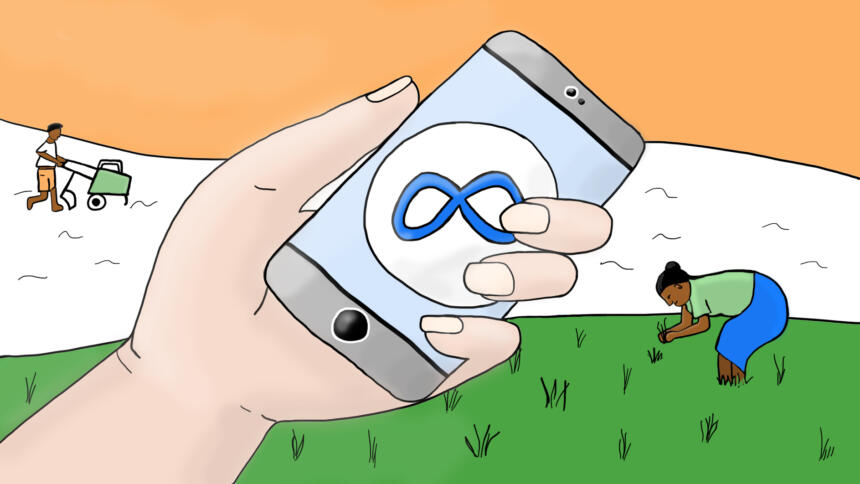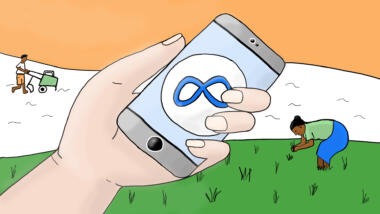>>Link to the German version. Link to part two of the series.<<
Mukesh Ambani is a man that once tended to be very skeptical of foreign interference in the Indian markets. „Data colonization“ is as bad as previous forms of colonization, the CEO of India’s largest corporation, Reliance Industries, stated in 2018. „India’s data must be controlled and owned by Indian people and not by global corporations,“ he said and urged the Indian government to make stricter laws to keep local data local.
However, just two years later, Reliance Industries greenlit a deal with Facebook, now known as Meta, that could provide Facebook access to the financial information of hundreds of millions of people in India. This partnership could also monopolize the entire food supply chain and put India’s food security at risk.
The two behemoths
Reliance Industries is a company rooted in the fabric of India. Often termed as India’s Rockefellers, Reliance Industries (RI) enjoys monopolies in key sectors of the Indian economy. It owns Reliance Jio, India’s largest telecom provider with almost 428 million users. Reliance JioFibre is the second largest internet broadband provider with 3.71 million customers.
RI is also the largest player in India’s retail sector, both analog and digital. The online groceries market platform Reliance JioMart for example is fast becoming a key player in a 900-billion-dollar retail market. RI is on the way to becoming a major buyer from the farmers. It has launched the JioKrishi app, a data analytics app meant to help farmers get higher agricultural yields. JioKrishi can be connected with JioMart.
Facebook, on the other hand, has long been trying to set up a bigger foothold in India. However, it has faced challenges. It failed in successfully introducing Freebasics in India, a free-of-cost stripped-down version of the internet. Facebook’s messenger WhatsApp has 500 million users in India. It has been wanting to roll out WhatsApp Pay, a mobile payment App, but has faced several legal obstacles concerning data privacy.
However, in April 2020 Facebook bought a 9.9% stake in Reliance Jio at $5.7 billion. Since then, it has expanded its operations further and on 5th November 2020, WhatsApp received permission from the National Payment Corporation of India – NPCI to roll out its payment systems in India. WhatsApp pay has also integrated Reliance JioMart within its system, meaning payment could be made to JioMart without leaving WhatsApp.
India’s part in Facebooks global plan
In India, Facebook is expanding its role far beyond that of a social media platform. WhatsApp has started providing business loans in collaboration with India Infoline Finance Limited (IIFL), which is a non-banking financial company. WhatsApp terms this as one of its main objectives in India. WhatsApp users can now get their business loans up to around 12.300 Euros in 5 minutes. The loan period is from 6 to 48 months.
India is no exception to Facebook’s expanding global operations. It has been single-handedly laying down heavy digital infrastructure in the countries in the global south. Its Free Basics application – Facebook’s free-of-cost stripped-down version of the internet – is currently live in 29 Africa Countries. Facebook has introduced 2Africa, a 45,000 km long undersea cable being built around Africa connecting 33 countries in Europe, Africa, and Asia with a promise to provide these countries with better internet.
However, India plays a vital part in its global outreach. India is a big testing ground for Facebook. Mark Zuckerberg admitted as much in an online conversation with Mukesh Ambani, chairman and managing director of Reliance Industries, where he said that „we actually test some of our new features here first before rolling them out globally“. Vishal Shah, head of products at Facebook’s new project Metaverse, called India „a Key Market“ for the Metaverse products. Metaverse is a network of 3D virtual worlds focused on social connection.
Moreover, Facebook already enjoys a huge user base in India. Apart from 500 million WhatsApp users, Facebook itself has 350 million users in India, far more than any other country. And if one includes Instagram as well, the number reaches up to 1.15 billion users in India.
Valuable financial information to exploit
The Reliance-Facebook partnership hasn’t just helped Facebook to get a foothold in India, it also provided access to data. The JioKrishi App, using farmland data, will alert the farmers about the right time to sow, irrigate, and fertilize the crops – crops that Reliance would later buy from the farmer. Integration of JioKrishi with Jio Mart and WhatsApp pay would provide Reliance and Facebook with complete information about what is being produced, what inputs are required to produce, and what the financial status of the farmer is.
In an online conversation with Mark Zuckerberg, Mukesh Ambani said that the partnership between WhatsApp Pay and JioMart will give „our small shops which exist in villages and small towns in India, a chance to digitize and be at par with anybody else in the world“. However, for every transaction made through WhatsApp pay, WhatsApp would receive valuable financial information of its users which it can share with Facebook. Having access to such financial information would also put WhatsApp in a position to grant extractive loans with high-interest values.
Mukesh Ambani further said that their partnership will „actually demonstrate that it is great for India, Indians, and small Indian businesses“. However, a monopoly over the groceries sector, retail market, and retail distribution would help Reliance set the prices in the entire food supply chain. This partnership puts Reliance and Facebook in a position where they can use their lending and the possible monopoly power to help keep competitors, suppliers, and buyers servile to the price-setting power of Reliance.
A „360-degree control“
The possibilities to further exploit this data seem endless. Reliance can use this data set on farmers‘ finances to make sure that the agricultural inputs it helps manufacture, like tractors, sell at the highest possible price. WhatsApp could provide high loans to the farmers to cover the cost of such inputs. „It’s 360-degree control,“ said Parminder Jeet Singh, executive director of IT for Change, a human rights-focused nonprofit in India.
Prabir Purkayastha, editor-in-chief at Newsclick, an independent news organization, says that the message that Reliance is sending to the world is: „Join us and we will make you win but under our flag“. Piggybacking on Reliance would allow Facebook to exploit Reliance’s deep reach in Indian markets and conduct data extraction. Working with Facebook would allow Reliance to use Facebook’s data analytic capacities. Together, they would monopolize large swaths of the Indian market, from mobile payment systems to the retail sector, from user information to deciding what farmers produce, buy and sell, and possibly the entire food supply chain.
India’s Food security at risk
It is not a new phenomenon that western tech companies enter markets in the global south and extract values without caring for what the consequences on local societies. Some scholars frame this common practice as digital colonialism – and Facebook is a name that comes up often.
For instance, Facebook has introduced its application Freebasics in Africa which is largely seen as an attempt to monopolize the Internet usage in Africa. When Freebasics failed in India, after being denied permission from Indian telecom regulators, Facebook board member and venture capitalist Marc Andreessen took to Twitter to criticise India’s „Anti-Colonial“ stand against Facebook: „Anti-colonialism has been economically catastrophic for the Indian people for decades. Why stop now?“ he tweeted. Later he deleted the post after backfire on social media.
In Brazil, Facebook and WhatsApp have created such dependencies that Facebook outages in Brazil cause disruption not just in private spaces, but in the public sector as well. However, in India, Facebook’s entry goes as far as to put India’s food security at risk too.
The Facebook-Reliance deal signals a massive shift in India’s food supply structure. Currently, the Indian state buys most of the food produced from the farmers with a minimum price guarantee to the farmers and sells it to poor people of the country at a very low price through a system called the public distribution system. More than 800 million people in India depend on this system.
The largest protest in history
However, the Indian Government is working on completely de-regulating the agricultural sector allowing for private players to buy directly from farmers at a price that the private corporation would set. Commenting on the privatization of the agriculture sector and its effect on the public distribution system, Inderjit Singh, a farmer activist from India in an interview to Jungewelt said: „The food security of the poor section is in very serious jeopardy“ as the poor people of the country would not be able to buy food grains at a price set by a private corporation.
This led to what many observers call the largest protest in world history, involving 250 million people including Indian farmers. Farmers burnt the Reliance Jio SIM cards in protest and attacked telecommunication towers owned by Reliance Jio. Fears of vandalism led to Reliance closing several of its retail stores costing it millions.
Facebook even took down the pages protesting the Indian government’s plan to bring in the private players which led to protests outside Facebook’s Menlo Park headquarters. Facebook restored the page, but did not comment on why it took it down. In a statement, it said: „We’ve restored Kisan Ekta Morcha’s (United farmer’s Front) FB page and regret the inconvenience caused.“
The farmers ultimately succeeded in forcing the Indian government to roll back its plan to completely privatize the Indian agriculture sector. But fears remain that the government would once again attempt to roll out its privatization plan once anger against it subsides.
Digital Colonialism
This article is part of a series on Digital Colonialism. We will cover different issues pertaining to the dominance of digital space in the global south by a handful of powerful countries and major tech companies. Over the past several years, scholars and activists have been increasingly writing on how this handful of firms make use of digital technologies to create dominance which extends itself to socio-political and economic space undermining the sovereignty and local governance in countries of the global south.
These scholars term this phenomenon as digital colonialism. They argue, that while the mode, scale, and contexts may have changed, colonialism’s underlying function of empire building, value extraction, exploitation of the workforce, and appropriation, remain the same
>>Link to the German version. Link to part two of the series.<<





0 Ergänzungen
Dieser Artikel ist älter als ein Jahr, daher sind die Ergänzungen geschlossen.